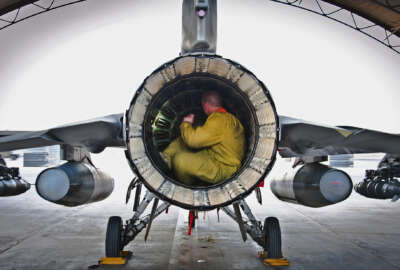

The Air Force's new BRICE app means a change in technology and talent management.
The Air Force recently deployed an application that allows maintainers to file paperwork while standing at an aircraft instead of walking to a computer at the end of the day and inputting forms all at once.
On the surface the app, Battle Record Information Core Environment (BRICE), seems painfully menial, — it’s something all of us can do from our smart phones — but for the Air Force the app signals a broad change in how the service uses technology and how that affects the retention and training of personnel.
“We live in an app-based world,” Maj. Gen. Cedric George, director of logistics for the air staff, told reporters Wednesday. “Everything is mobile. We pull GPS and consume data out of cloud, and in our case we need secure cloud. When you and I engage with an app it’s got to be intuitive and that app development is done in an agile DevOps construct.”
The Air Force realizes it needs to thrive in that new environment and its old IT legacy systems that require desktop computers, handwritten forms and CD-ROMs simply won’t cut it in order to win future wars.
BRICE is one of the first applications to bring the Air Force from 2005 technology to 2019 technology. It’s a secure app that allows airmen to basically do things as anyone in 2019 expects to do things — on an app, using the internet and integrated with the cloud.
“The Air Force is undergoing a digital transformation even as we talk,” George said. “The logistics community is leading the way. We realize we are in the middle of a digital age and we know that digital-age speed, agility and reliance is what’s going to win tomorrow’s war.”
BRICE uses Apple technology on an iPad. The app allows “maintainers to directly access the maintenance database from the flight line at the point of aircraft repair. This eliminates the need to secure their tools, then go back to their office and log into a network computer to document the maintenance actions performed,” a press release from Monkton, the app developer, states. The app accesses data in an Amazon Web Services Cloud to give maintainers all the information and templates they need to write reports at the point of repair.
“This app is saving each maintainer about one hour per shift,” Chris Gorman, co-founder and COO of Monkton, told Federal News Network. “It might not sound like a lot, but once someone started crunching the numbers, if this is rolled out to all 18,000 maintainers it works out to about 2,700 full-time employees.”
It also saves $16 million a year, George said. Right now, only about 100 maintainers use the app and the service is rolling it out to 100 more.
But the potential is big for the Air Force, which is trying to keep its aircraft at 80% readiness and is also trying to retain and recruit young maintainers after the service found it was in need of about 4,000 a couple years ago.
Now that the Air Force shored up the deficit, it is still in an experience shortage. The maintainers it recruited are still green, and so the service needs to retain them to get them to more skilled levels to work on complicated systems and train other maintainers.
This year the Government Accountability Office found the Air Force is struggling to retain its experienced maintainers, and it has no strategy to keep them around.
“Maintainers cited better pay as a reason to transition from the Air Force to the commercial aviation industry,” GAO said. “They also noted consistent schedules, 8-hour work days and overtime pay as additional benefits.”
Saving time by working in a more futuristic work environment might help keep maintainers around.
“We are in a war for talent,” George said. “Millennials walk in the door expecting to do meaningful work and to cut out all the nonsense. You can imagine having a maintainer show up and I tell them ‘Congratulations, you’re in the best Air Force on the planet, except I’m going to have to have you spend 50 minutes a day going back and transcribing your documents into a computer.’ You can imagine their reaction. They might do it for a while, but they are going to want to move on to something else.”
George said the Air Force should be on the bleeding edge of technology and should align with the technology people use in their everyday lives.
Copyright © 2025 Federal News Network. All rights reserved. This website is not intended for users located within the European Economic Area.
Scott Maucione is a defense reporter for Federal News Network and reports on human capital, workforce and the Defense Department at-large.
Follow @smaucioneWFED

